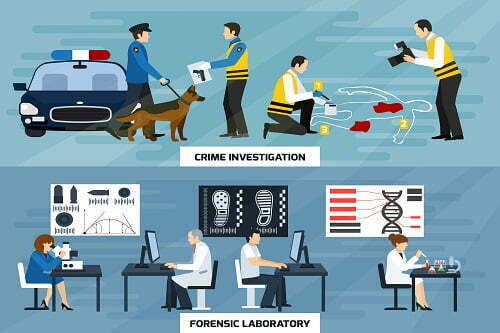Table of Contents
- What are forensic science courses?
- Forensic science courses after 12th: Highlights
- Forensic science subjects
- BSc forensic science admission
- BSc forensic science courses
- BSc forensic science syllabus
- India’s Bsc forensic science institutes
- Colleges & universities to study forensic science abroad
- BSc forensic science scope 2022
- BSc forensic science career & salary
- Key takeaways
- FAQs
Forensic Science Course Syllabus concentrates on showing the existence of a crime, using instrumental methods, forensic techniques, forensic photography, forensic toxicology, fingerprint impressions & analysis, DNA isolations & profiling, etc.
Various programs are providing forensic science courses, and some of the most well-liked ones include BSc and MSc degrees in the subject. Mumbai University, Osmania University, NIMS University, Integral University, and others are top colleges.
Forensic scientist, crime scene investigator, forensic analyst, legal counselor, lab assistant, forensic technician, forensic toxicologist, and forensic professor are some examples of job profiles in the field of forensic science. Starting pay for these positions ranges from INR 3,00,000 to INR 8,00,000 annually.
Read on to know more about these in detail!
What are forensic science courses?
An interdisciplinary field of science called forensic study includes the core concepts from all scientific courses, including chemistry, biology, physics, and mathematics. It is mostly used to identify, recognize, examine, and observe various kinds of tangible evidence that is frequently found at crime scenes.
Law enforcement and crime prevention are two areas where forensic scientists will operate. The contemporary legal system places a great emphasis on the skills and expertise of forensic scientists since, in your position, you must be effective, impartial, and, most importantly, accurate.
You must complete a specified educational program in order to become a forensic scientist. After a student has completed grade 12, universities all around the world offer forensic science courses at the undergraduate, graduate, and doctoral levels.
Forensic science courses after 12th: Highlights
| Topics | Description |
| Specialization | Forensic science |
| Degree options after 12th | Diploma (6 months)Bachelor’s (3 years) |
| Eligibility | 10+2 with science stream |
| Lateral entry option | Direct entry to bachelor course for those having a 3-year diploma |
| Admission process abroad | Based on your academic profile and application |
| Admission process in India | Entrance exam based |
| Entrance exams | CG PAT IISER IAT OUAT GSAT BHU UET NEST |
| Fees | Around 50,000 INR in India, Over 25 lakhs to 50 lakhs abroad |
| Average starting salary | 2- 5 lakhs per annum |
| Jobs | Forensic scientist, private investigator, forensic serologist, forensic architect, forensic engineer, drug analyst, forensic toxicologist, forensic consultant, crime laboratory analyst |
Forensic science subjects

Forensic Sciences include forensic pathology, odontology, forensic medicine, psychology, and many more disciplines. Subjects include-
- Crime and Investigative Techniques
- DNA Profiling
- Forensic Biology
- Forensic Photography
- Forensic Psychology
- Forensic Toxicology
- Forensic Physics
- DNA Isolation
- Forensic Ballistics
- Questioned Documents
- Cyber Forensics and Law
- Analytical Chemistry
- Instrumental Chemistry
BSc forensic science admission
Admission based on merit
Merit-based admission is available at several universities, including Swami Vivekananda University and IGNOU. The applicants must pay the application fee and submit the necessary supporting documentation to the institute’s administration. The institution would next send offer letters to those on its merit list.
Admission based on entrance exams
Some universities, like Amity University, the University of Delhi, and the Karnataka University, provide admission via state- or country-level entrance exams. Here are a few of them with a brief description:
Exams for BSc in forensic science
- The Delhi University Entrance Test (DUET) is an entrance examination. The NTA administers the test. The CBT exam lasts for two hours and carries 100 total points. It takes place in 12 Indian cities.
- KIITEE is a CBT test that Kalinga University offers. There are three phases in the test.
- Siksha ‘O’ Anusandhan University administers the SAAT, a nationwide admission examination. Essentially, it is a multiple-choice test that is given in CBT format.
- KCET- The Karnataka Examination Authority administers the KCET test. It is a CBT test at the state level. Only students from Karnataka are eligible.
BSc forensic science courses
You must complete a certain educational program in order to become a forensic scientist. After a student has completed grade 12, universities all around the world offer courses at the undergraduate, graduate, and doctoral levels. Let’s examine some of the degree courses offered in India and other countries.
| Education level | Courses | Duration |
| Diploma | Diploma in Forensic MedicineForensics Diploma (Online) | 3 months to 6 months to 1 year |
| Undergraduate | BSc Forensic ScienceBachelor of Accident ForensicsBachelor’s in Criminal Justice-Forensic ScienceBachelor of Forensic Science Bachelor of Laws (Honors)Bachelor of CriminologyBachelor’s in Forensic InvestigationBachelor of Applied Science in Forensic Studies | 3 years |
| Postgraduate | MSc Forensic ScienceMaster of Forensic Behavioural ScienceMSc in Forensic PsychologyMasters in Forensic AnthropologyMaster of Philosophy in Forensic Science | 2 years |
BSc forensic science syllabus
It is essential to understand the course’s curriculum, including pertinent BSc forensic science topics. Each year’s course is displayed below.
Year 1
| Criminal Behaviour | Crime and Social Culture | Forensic Science Laboratory Experiments |
| Behavioural Science | Physical Evidence in Forensic Science | Introduction to Criminology |
| Blood Pattern Analysis | Psychological Factors | Crime Scene Investigation |
Year 2
| Typewriting and Handwriting Analysis | Classification of Poisons on the basis of their effect on the Human Body | Analysis of Biological Fluids |
| Introduction to Toxicology | Fundamental Introduction to Chemistry | Behavioural Science |
| Photography | Forensic Anthropology | Benzidine Test and Blood Analysis |
Year 3
| Wound and its Medico-Legal Aspects | Arson and Explosion Investigation | Collection of Firearms- related Evidences |
| Personal Identification | X-Ray Diffraction Techniques | Microscopy: Compound Microscope and Simple Microscope |
| DNA Fingerprinting | Ballistics- Classification of Firearms | Arson and Explosion Investigation |
India’s Bsc forensic science institutes

The top forensic science institutes in India are listed below:
- Banaras Hindu College (BHU)
- Lovely Professional University
- Gujarat University (LPU)
- The NorthCap College
- Pondicherry University
- Amity University
- Gurgaon Parul University
- SGT University
- University of Apex
Colleges & universities to study forensic science abroad
Many institutions offer forensic science courses after the 12th grade throughout the world. The top institutes are mentioned below:
- Southern Utah University
- University of Technology Sydney
- Griffith University
- Deakin University
- Abertay University
- University of Cumbria
- Universiti Sains Malaysia
- Universiti Kebangsaan Malaysia
- Canberra Institute of Technology
- CQ University Australia
- University of Canberra
- University of Kent
- London Metropolitan University
BSc forensic science scope 2022
- The complexity of forensic science has significantly expanded due to an increase in crime and criminals. It offers a variety of employment options.
- Such professionals operate in the forensic laboratory for the prosecution or the defense and give expert testimony in criminal and civil proceedings. There are positions available for forensic scientists in the public sector.
- They are employed by numerous law enforcement and research organizations, provincial and federal investigating agencies, and the legal system. Some applicants meet the requirements for specific private agencies in this area.
- Government agencies may also employ forensic scientists. They are employed in numerous law enforcement agencies, academic institutions, and the criminal justice systems of local, state, and federal governments. There are several additional workers in this field at private companies.
BSc forensic science career & salary
Following the completion of a BSc in India, several careers are available. The list below includes some, along with salary.
| Job | Salary |
| Forensic scientist | INR 4,87,950 |
| Drug analyst | INR 3,73,000 |
| Forensic toxicologist | INR 10,000 |
| Crime laboratory analyst | INR 6,90,000 |
| Forensic serologist | INR 4,50,000 |
Key takeaways
- Courses in forensic science may be both academically challenging and gratifying.
- There are several options for a career.
- There are premium institutions providing education in the field of forensics.
Was this blog informative? If so, please share your thoughts in the comments below. Click here to reach out to us for more information on forensic science courses. We would be happy to assist you with your queries!
Liked the blog? Read more: Psychology books | 7 amazing books students must know about!
FAQs
Q1. What do forensic scientists do on a day-to-day basis?
Answer – Take photographs of the crime scene and evidence. Make sketches of the crime scene. Record observations and findings, such as the location and position of evidence. Collect evidence, including weapons, fingerprints, and bodily fluids.
Q2. What do you need to know about forensic science?
Answer – If you wish to work in a crime laboratory as a forensic chemist or biologist, you must have a thorough grounding in the basic sciences of chemistry, biology, physics, and mathematics. This can be achieved by obtaining a college degree in one of these sciences.
Q3. What equipment do forensic scientists use?
Answer – Forensic scientists use equipment in the field such as specialized powders, brushes, cameras, and tape to capture fingerprints. They also have computers in the lab that are used to analyze fingerprints and compare the gathered prints to a suspect’s prints or existing databases.






